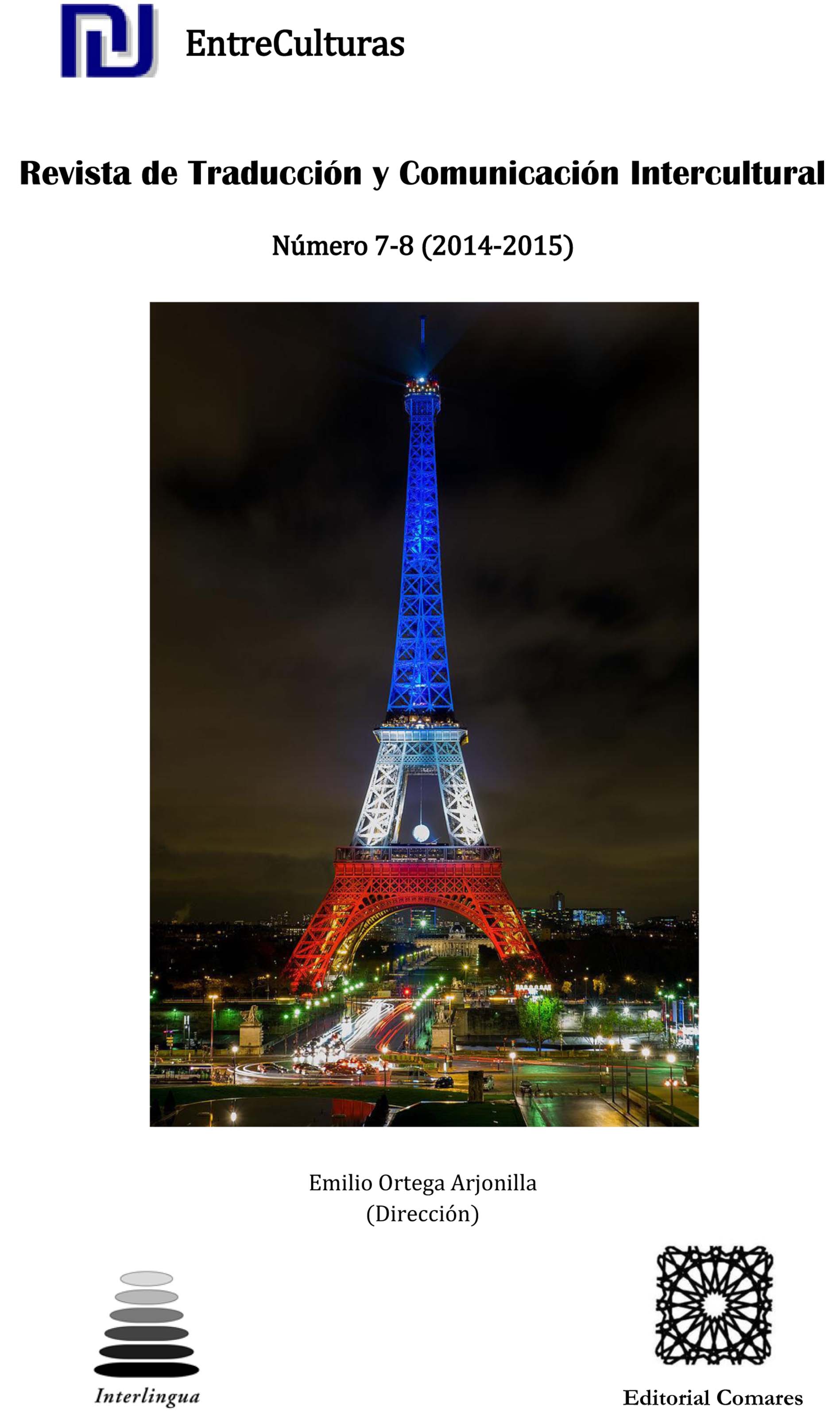LOS FALSOS AMIGOS EN LA FRASEOLOGÍA ESPAÑOL–ÁRABE: EL CASO DE LOS FRASEOLOGISMOS SOMÁTICOS
DOI:
https://doi.org/10.24310/Entreculturasertci.vi7-8.11344Keywords:
Contrastive Phraseology, Somatisms, False FriendsAbstract
The aim of this paper is to stimulate the attention of contrastive phraseology between Arabic and Spanish languages. In this work will be studied the contrastive analysis of false friends in the somatic phraseology between Spanish and Arabic languages. On the other hand, this paper finds out, by examples, the serious problem of false friends, which set out in the translatological and linguistic field.
Downloads
Metrics
References
Abu Z?lal, ???am Al-Din (2006). ´Al-T??abyr ´Al-´????la??yya B?yn? ´Al-n?dh?r?yya W? Al-Ta?byq, Alejandría, Dar ´Al-W?fa´ L? D?nya ´Al-??ba?? W? ´Al- N?shr.
Al-?amzawy, ??la´ Ismail (2006). «´Al-m?th?l W? ´Al-T??byr ´Al-???yla??yya Fy
´Al-T?rath ´Al-‘?r?by», [En linea] < http//www.saaid.net/boob> [consulta de 29 de agosto de 2013].
Mellado Blanco, Carmen (2004). Fraseologismos somáticos del alemán. Frankfurt, Peter Lang.
Corpas Pastor, Gloria (1996). Manual de fraseología española, Madrid, Editorial Gredos.
----- (2003). Diez años de investigación en fraseología: análisis sintáctico-semántico, contrastivos y traductológicos, Madrid, Iberoamericana, 2003.
Daw?d, Mo??mm?d (2007). J?s?d ´Al-?nsan W? ´Al- Ta?byrat ´Al- L?gh?w?yya. El Cairo, Dar Ghar?b.
Domínguez, Pedro. (2009). «Los falsos amigos desde la perspectiva de la teoría de conjuntos», Applied Linguistics Now: Understanding Language and Mind / La lingu?ística aplicada actual: comprendiendo el lenguaje y la mente. Almería, Universidad de Almería, pp. 1111-1126, [en línea]. <http://www.aesla.uji.es/actasalmeria/pdfs/chamizo.pdf> [consulta de 10 de Mayo de 2013].
Fayed Kamel, W?fa´ (2007), M??j?m ´al-t??abyr ´al-´??t?la?yya fy ´al-‘?r?b?yya ´alm? a??ra, El Cairo, Abu al- Hawl. (DWK)
García Page, Mario (2008). Introducción a la fraseología española, Barcelona, Anthropos.
Gogazeh, Ziyad. (2007). «Los falsos amigos en el léxico español de origen árabe», En PhilologiaHispalensis número 21 (2007), pp. 75-95, [en línea]. <http://institucional.us.es/revistas/philologia/21/5%20Ziyad%20Muhammad.pdf> [consulta el 5 de mayo de 2013].
Hosam Aldin, Karim Zaki (1985). ´al-ta?byr ´al-´????la?y. El Cairo, Maktabat Alanglo al-Masriya.
Mazhar, Ismail (1950). Qamws ´al-j?mal w? ´al-‘ibarat ´al-´?s?t?lah?i?yya. ´Inj?liyziy- ??r?by. El Cairo, M?kt?b?t ´al-N?hd?a ´al-M?s?ri?yya.
Moliner, María (1998), Diccionario de uso del Español (DUE). Madrid, Gredos, 2 volúmenes
Muñez, Carmen (1999). «Alcance de la gramática en la traducción» En Revista Española de Lingu?ística, 163.
Qasmi, Ali. (1981). «´al-t??abyr ´al-´??t?la??yya w? ´al-s?yaq?yya w? m??j?m ??r?by l?ha», M?j?ll?t ´al-l?san ´al-??r?by, vol. 17, 17-34, [en línea]. <http://lisaanularab.blogspot.com.es/2013/01/1-56.html> [consulta de 30 de abril de 2013].
Real Academia Española, Diccionario de la Lengua Española (DRAE), Madrid, Espasa-Calpe, 22 ediciones.
Ruiz Gurillo, Leonor (1997). Aspectos de fraseología teórica española, Valencia, Universitat de Valencia.
Seco, Manuel., Andrés, Olimpia., Ramos, Gabino (2004), Diccionario fraseológico documentado del español actual locuciones y modismos españoles. Madrid, Aguilar.
UNESCO: Transliteración. Disponible en: http://portal.unesco.
Downloads
Published
How to Cite
Issue
Section
License
All contents published in Entre culturas. Revista de traducción y comunicación intercultural are protected under the Creative Commons Attribution-NonCommercial-ShareAlike 4.0 International (CC BY-NC-SA 4.0) license. All about this license is available in the following link: <http://creativecommons.org/licenses/by-nc-sa/4.0>
Users can copy, use, redistribute, share and exhibit publicly as long as:
- The original source and authorship of the material are cited (Journal, Publisher and URL of the work).
- It is not used for comercial purposes.
- The existence of the license and its especifications are mentioned.
There are two sets of authors’ rights: moral and property rights. Moral rights are perpetual prerogatives, unrenounceable, not-transferable, unalienable, imprescriptible and inembargable. According to authors’ rights legislation, Entreculturas. Revista de traducción y comunicación intercultural recognizes and respects authors moral rights, as well as the ownership of property rights, which will be transferred to University of Malaga in open access. The property rights are referred to the benefits that are gained by the use or the dissemination of works. Entreculturas. Revista de traducción y comunicación intercultural is published in an open access form and it is exclusively licenced by any means for doing or authorising distribution, dissemination, reproduction, , adaptation, translation or arrangement of works.
Authors are responsable for obtaining the necessary permission to use copyrighted images.





7.png)
